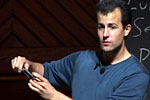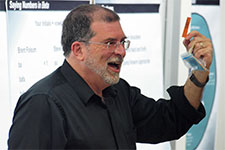During the WIPO negotiations on disabilities, the White House has told U.S. Blind groups it will kill a WIPO treaty on copyright exceptions for persons who are blind or have other disabilities if the treaty covers audiovisual works, including those used in education, including distance teaching programs.
To appreciate the importance of this omission, consider the explosion in new online courses offered by Universities, professional socieities and for profit educational services. For example, to mention only a few:
- Harvard’s Extension online courses
- MIT’s distance education courses
- Kaplan University
- Stanford Online seminars
A common distance education format involves a video of a professor speaking, and various visuals, such as the use of a blackboard or power point slides, to illustrate a point. These courses could be made accessible to a blind person if covered by the exceptions.
 |
 |
The USPTO has told KEI that the audiovisual works issue is a red line, not on policy grounds, but because the MPAA political influence with the White House.
The fight at WIPO is over the definition of a work. The US wants to limit the exceptions to works [in the form of text, notation and/or related illustrations], and opposes [in any media]. India, a country with a large film industry, is among those who want exceptions to cover audiovisual works, and India is supported by other countries. Brazil has suggested a compromise, to have the decision on audiovisual works be left to national discretion. The US delegation has sent a tough message to the blind organizations, effectively threatening to kill the treaty is AV works are included.
ARTICLE A
DEFINITIONSFor the purposes of these provisions
“work”
means literary and artistic works within the meaning of Article 2.1 of the Berne Convention, [in the form of text, notation and/or related illustrations], whether published or otherwise made publicly available [in any media].